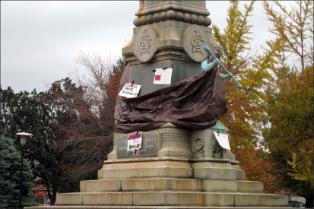To its supporters, it is a memorial to those who died. To its detractors, it is representative of hate and violence.
These disagreements came to head when a group of about 30-35 protesters gathered near the Louisville Confederate Monument along Third Street on the University of Louisville’s Belknap campus last Tuesday.
The protesters gathered around the monument and tied up posters and banners calling for an end to racism and bigotry.
Some of the protestors, including Camilla Jasis, a sophomore women’s and gender studies major, support the removal of the statue.
“I’m surprised the city hasn’t [removed] it already,” Jasis said. She cited the monument as standing for racism and hate. She wishes that U of L “had something that stood for diversity and progress instead.”
The Confederate War Monument stands at 75 feet tall with three Confederate soldiers cast in bronze and inscriptions to the fallen. It was donated to the city of Louisville in 1895 by the Kentucky Woman’s Confederate Monument Association and sits on city-owned land.
However, since 1895, the campus has grown to surround the monument and many students walk past the monument everyday.
“The monument is both an emblem of history and a reminder of hate” Ray Loranger, a sophomore chemistry major said. “It is our responsibility at this day in age to remember those who fought but to also remain sensitive to the affects and effects of that fight.
“We already fought one Civil War on the issue, and it would reflect badly on us if we cannot restrain our passions and approach this issue understanding the pains that surround it,” Loranger said.
However, plans have been underway since November of 2002 to include changes to Freedom Park, where the statue is located, in order to better represent the community.
According to University Archives, U of L’s Vice President of Business Affairs Larry Owsley and Arts & Sciences Dean Dr. Dean Blaine Hudson, collaborated in late 2002 to make several additions to the park.
According to the plan, those changes include a plaza to be devoted to the “struggle for freedom,” one or more major statues, exhibits focusing on the Underground Railroad and other Civil War events in Louisville, a Civil War battlefield memorial featuring historic trees, use of The Playhouse for performances, lectures and other events related to Freedom Park and a Web site.
According to Owsley some of the aforementioned features have been added to the park, but the remaining features to be added are pending due to a lack of private funding. Owsley said that U of L has made grant requests in attempts to implement the changes before the Abraham Lincoln Bicentennial, which will be on Feb. 9, 2009.






